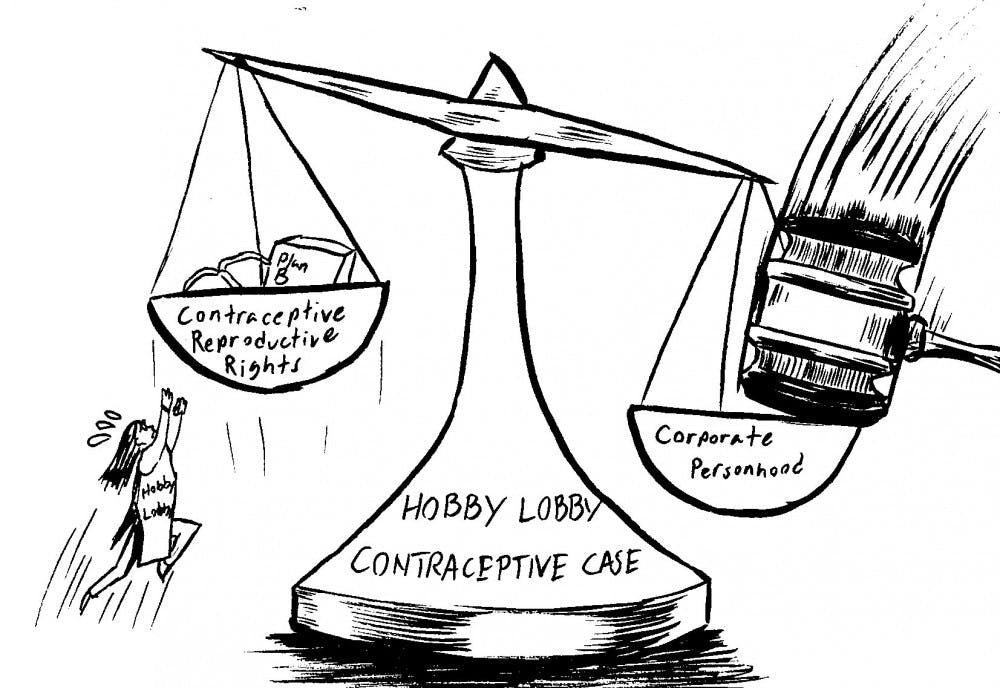The United States is the land of the free. As a journalist, I recognize my freedoms often, but I also know at some point a line has to be drawn with the freedom everyone is given.
National craft store chain Hobby Lobby was created by David Green, an Evangelical Christian who believes his billion-dollar company belongs to God.
I will not attack Green for his religious beliefs or opinions on birth control — he is fully entitled to both. But those opinions have now infringed on the rights of his employees.
In 1993, the Religious Freedom Restoration Act, which was instituted to prevent other laws from disturbing a person’s right to exercise their religion, was passed.
Since the Affordable Care Act, also known as Obamacare, mandates companies provide their employees with birth control under their insurance plans, Green and members of his family who own other Hobby Lobby locations refused to allow their female employees that right.
Freedom of religion is the freedom to exercise it in and out of your place of worship without the fear of oppression. No one should be stopped in public for praying or be discriminated against for wearing certain clothes because of their religion. And as annoying as it may be, I don’t think the Wells Hall preacher here in East Lansing is doing anything wrong — he should just pick a better place to preach, or maybe be a bit more polite about it.
In the workplace, freedom of religion can be expressed just the same as in public. But CEOs should not be able to decide on the ease of access to the rights of their employees.
The Supreme Court ruled 5-4 that closely held for-profit corporations cannot be forced by the government to give employees free birth control under Obamacare. Closely held companies are 50 percent or more of the value of a company’s stock must be held indirectly or directly by five people or fewer.
To put this into bigger perspective, an estimated 90 percent of companies in the United States are closely-held. So, the Supreme Court just gave a lot of companies the right to not allow free contraception for employees, if they so desired.
Yes, employees who are angered by the ruling can leave their job, and there are ways to get birth control outside an employer. But let’s look at the cost of contraceptives compared to a worker’s income.
Full-time employees at Hobby Lobby are paid at least $14 an hour and part-time employees are paid $9.50 an hour. According to the Planned Parenthood website, the “abortion pill” can cost from $300 to $800 dollars.
For a woman working full-time at Hobby Lobby without this pill on her insurance, it would take her more than 21 hours of work to pay off a pill that costs $300 — that’s half a full-time work week. A part-time employee wanting to pay off an $800 pill would have to work 84 hours to pay it off and at 20 hours a week, that’s a full month of work. For the $300 pill, which would be the more likely option for a part-time worker, it would still take 31 hours. And this is without taking income tax into consideration.
Birth control is a woman’s choice and her responsibility. Her choice shouldn’t concern her employer whatsoever as her employer has no right to be involved in their employees’ personal lives.
Since the Supreme Court ruled for the Hobby Lobby case, this may lead to other religions appealing against the Affordable Care Act.
Take Christian Scientists for example. People who practice this religion do not believe in vaccinations. Because of this ruling, a Christian Scientist company owner now can now appeal the right to deny their employees the yearly flu vaccine under their insurance. In this context, the ruling seems a bit ridiculous.
The same goes for ruling against contraceptives. Allowing free birth control is a movement towards better health for women and not allowing birth control is another step back.
As Americans, we are allowed certain freedoms by our Constitution but the line has to be drawn when those “freedoms” infringe on the rights of others.
David Green can be fully anti-contraception and that is his freedom, but that freedom should not follow through to his company or to employees who might not share his views.
All companies should be following the Affordable Care Act it is the law and that’s where the line has been drawn. There isn’t an official religion in this country, and we should respect all religions, but one person’s religious beliefs cannot be allowed to infringe on the rights of others.
Meagan Beck is a State News reporter. Reach her at mbeck@statenews.com.







